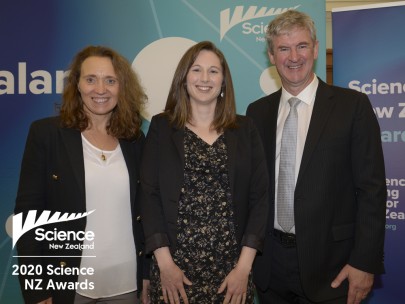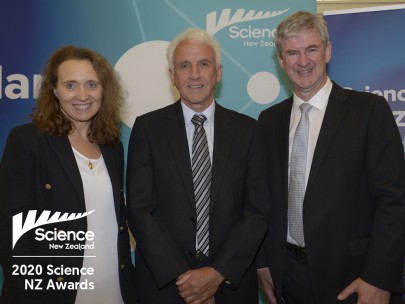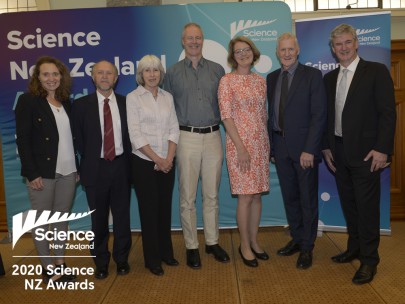Early Career Researcher Award
For this award the winners must have completed their highest research qualification in the last 10 years, and their research must have demonstrated benefit to New Zealand's economic, environmental, cultural or social wealth or well-being.
Attracting and nurturing extraordinarily talented and passionate early career researchers is critical to our success in contributing to the wealth and wellbeing of New Zealand.
These Awards recognise early career researchers who have already made exemplary contributions to the mission of our Crown-owned research organisations and show conspicuous promise.
Rachelle Binny

Rachelle Binny (centre) with MW board member Prof. Emily Parker and MW CEO Dr Richard Gordon
Rachelle is a mathematician bringing new dimensions to the study and control of vertebrate pests.
His work establishes pest density thresholds needed to deliver a benefit to endemic species. This work is critical for cost-effectively managing pests and predators in New Zealand.
In a brilliant piece of cross-discipline research, she applied these predator-modelling skills to the Covid-19 virus epidemiology and spread. She worked with mathematicians and modellers at Te Pūnaha Matatini, and Auckland and Canterbury universities. The work helped to inform Government decisions on lockdown levels and the likely probabilities of disease transmissions given changes in those levels.
She maintains wide-ranging stakeholder engagement – including community engagement and high-quality science papers and conferences. She also co-supervises a PhD student in Mathematics and Statistics.
Individual or Lifetime Achievement Award
The winners in this category are individuals who are current or retired employees of a Science New Zealand member, or its predecessor, and who have contributed substantially to New Zealand's economic, environmental, cultural or social wealth or well-being.
This can be through their work overtime or through a specific discovery, development or application.
These Awards recognise people whose leadership and achievements stand out for their contribution to the mission of their research organisation and for the inspiration and guidance which they provide to their colleagues and the wider community.
Bruce Warburton

Bruce Warburton (centre) with MW board member Prof. Emily Parker and MW CEO Dr Richard Gordon
Bruce began his wildlife ecology career in the 1970’s with extensive field research on possums.
Initially focused on the protection of native forests, he extended his work to the apparently unstoppable spread of TB.
He has helped develop humane and targeted possum control tools. His research on the aerial application of 1080 showed that landscape-scale control programmes could achieve exceptional results with greatly reduced amounts of bait.
His work means that possum kills have increased from 70% to 95%, while bait use is reduced by 80%. His current research targets that last 5% of predators, to meet the PredatorFree 2050 goal.
He has over 70 papers published, and over 150 technical reports.
He has been awarded the Royal Society of New Zealand Bronze Medal for his contribution to animal welfare research and the New Zealand Biosecurity Institute’s Peter Nelson Memorial Award for his contribution to pest management in New Zealand.
Team Award
For these Awards, the winning team must be a group of three or more people who have contributed substantially to New Zealand's economic, economic, cultural or social wealth or well-being.
There must be at least one scientist in the team, and team members can come from beyond their own organisation.
A key feature of the CRIs and Callaghan Innovation is their ability to create and enable multi-skilled and multi-disciplinary teams which can come up with brilliant ideas or solutions - and then move these from idea to real world impact.
These Awards recognise teams who have excelled in combining highly talented and dedicated people with diverse skillsets, and then deliver science and innovation which makes a difference for New Zealand.
The Land Cover Database Team

John Dymond, Anne Sutherland, Peter Newsome, Heathern North, and David Pairman from the LCDB team at the Science NZ award ceremony, along with Emily Parker (far left) and Richard Gordon (far right)
This is a multi-disciplinary team of land use and ecosystems researchers, remote sensing and geospatial experts and informatics specialists.
Together, over many years, they have created New Zealand’s Land Cover Database. The Landcover Database requires state of the art remote sensing, and a pipeline of processing, analysis, automated map production, and ground truthing.
The Database is a critical dataset for the government and is the authoritative map showing how land cover nationwide has changed since 1996.
It is used by national and regional government, agribusiness, consultants, farmers, educators, Māori stakeholders, and researchers for planning, conservation and environmental modelling.
It helps us to understand the pressures that different land uses are placing on the biodiversity and functioning of ecosystems. It supports State of the Environment reporting requirements, and its benefits and impacts are ongoing.
The Team has included colleagues from Ministry for the Environment, Ministry for Primary Industries, and Department of Conservation.
